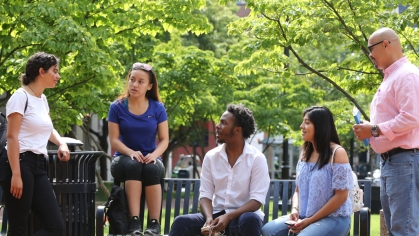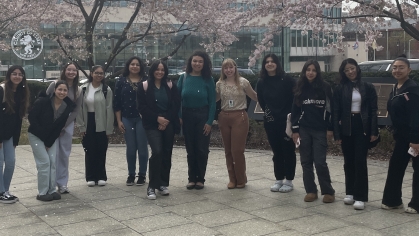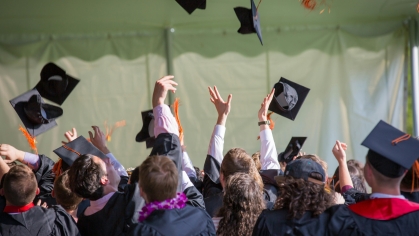Rutgers-Newark Gets $2.8 Million Federal Grant to Increase Digital Equity Throughout Campus and City

Rutgers-Newark has been awarded a $2.8 million grant to increase digital equity in the city of Newark and on campus, part of a federal program that was announced by Vice President Kamala Harris this week.
It was one of 93 universities chosen by the Department of Commerce’s National Telecommunications and Information Administration for its Connecting Minority Communities Pilot Program. The department awarded the schools a total of $175 million.
Harris noted that more than 24 million Americans still don’t have high-speed internet access, a statistic the Biden administration hopes to change.
“In America, in the 21st century, the ability to connect to high-speed Internet is not a luxury. It is a basic necessity,’’ Harris said when she made the announcement at Benedict College in South Carolina on Monday. The college is among the schools chosen for funding under the plan.
The Rutgers-Newark program would expand broadband access to underserved communities, teach computer literacy skills, and help train Newark residents and RU-N students for careers in tech service.
“We intend to use the award to make a collective impact on the city,’’ said Amber Randolph, Rutgers-Newark senior vice chancellor for administration, economic development and chief financial officer. Randolph is the principal investigator of the grant.
“Access to affordable, reliable, high-speed Internet service is necessary for minority students and local communities to fully access school, healthcare, and jobs,” said U.S. Secretary of Commerce Gina Raimondo. “Funding from the Connecting Minority Communities program has been distributed to help make Internet connectivity a reality for tens of thousands of students.’’
Gov. Phil Murphy praised the Rutgers-Newark program, in addition to plans at Felician University in Rutherford, the other New Jersey school that was selected for an award.
“As has proven particularly important over the past several years, providing equitable access to the internet and technological equipment is crucial to ensuring the success of our students,” Murphy said. “The grants…will ensure greater access to these resources on behalf of countless students from disadvantaged backgrounds.”
RU-N’s program, called "Creating Connections: Building Equitable Access to Broadband in Newark through Public-Private Collaborations,’’ aims to enhance digital infrastructure and equitable access in Newark, in addition to expanding campus Wi-Fi and upgrading RU-N’s technology resources.
“An important objective is to maximize our campus footprint to bring equitable broadband access to residents who live nearby,’’ said Randolph.
Additional goals include working with the NJ Department of Corrections’ residential community reintegration programs to provide technological devices, such as laptops, tablets, mobile phones, and desktops computers, and digital literacy skills to incarcerated residents. The RU-N plan will also help Newark residents and students gain access to career training that will allow them to compete in the tech and telecom industry and will deliver digital literacy training and devices to community members.
The effort includes partnerships with City of Newark, Newark Alliance, Teknogrid, Invest Newark, Urban League of Essex County, State Department of Corrections, Kite and Key, the Newark School of Data Science & Information Technology and a number of other Rutgers-Newark administrative and academic departments.
“Rutgers-Newark’s digital equity program will build upon the work the city of Newark is undertaking to increase access and service to all residents”, said Aaron Meyerson, Invest Newark’s chief innovation economy officer and broadband director.
“As a city we’re looking at connectivity as a whole, but focusing on those most in need,’’ he said.
“What’s great about a university partner is they pay particular attention to the development of the community and the students they serve. They’re using this opportunity to align with the city’s connectivity and educational programs. They’re using their own facilities as a training bed for this work’’ he added. “That’s a unique thing to see.”


